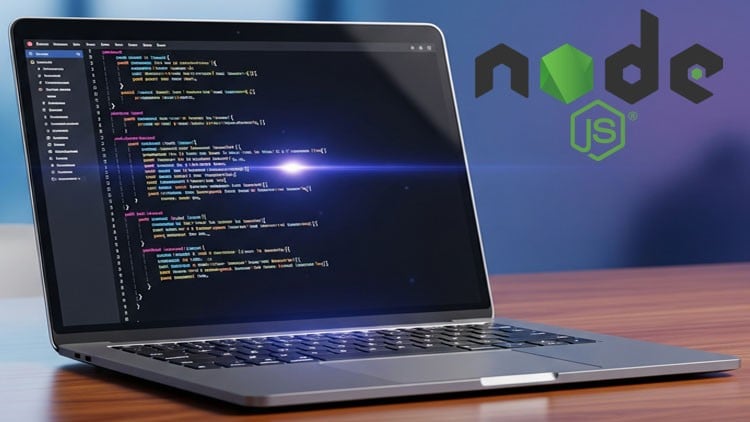
Start coding with Node.js learn backend development, build APIs & create full-stack apps from scratch with hands-on
⏱️ Length: 3.5 total hours
⭐ 3.81/5 rating
👥 5,512 students
🔄 June 2025 update
Add-On Information:
Note➛ Make sure your 𝐔𝐝𝐞𝐦𝐲 cart has only this course you're going to enroll it now, Remove all other courses from the 𝐔𝐝𝐞𝐦𝐲 cart before Enrolling!
-
Course Overview
- This comprehensive Node.js bootcamp is meticulously designed to transform you into a proficient backend developer, capable of building robust, scalable, and high-performance applications.
- Embark on a practical, project-centric journey that transcends theoretical concepts, guiding you through the intricate process of developing real-world backend services and APIs from the ground up.
- Beyond merely introducing syntax, this course focuses on architectural best practices, design patterns, and efficient coding methodologies crucial for modern web development.
- You’ll master the art of leveraging Node.js to create dynamic, data-driven applications, understanding how to architect full-stack solutions that stand out in today’s competitive digital landscape.
- Delve into advanced topics that solidify your understanding, enabling you to build complex systems with confidence and precision.
- The curriculum is structured to provide an intensive, immersive learning experience, ensuring you grasp not just what to do, but why and how to implement best-in-class solutions.
- Prepare to build a strong foundation that empowers you to innovate and solve real-world problems using cutting-edge Node.js technologies.
- This bootcamp is your gateway to mastering backend development, equipping you with the skills to contribute effectively to any development team or spearhead your own projects.
-
Requirements / Prerequisites
- Basic JavaScript Fundamentals: A foundational understanding of JavaScript concepts such as variables, data types, functions, conditional statements, loops, and object-oriented programming principles is essential to make the most of this course.
- Command Line Familiarity: Basic comfort navigating and executing commands in your operating system’s terminal or command prompt (e.g., creating directories, running files).
- Text Editor: Access to a code editor like VS Code (highly recommended for its rich features and extensions for Node.js development) or Sublime Text.
- Internet Connection: A stable internet connection is required for accessing course materials, downloading packages, and exploring external resources.
- A Computer: A personal computer (Windows, macOS, or Linux) capable of running development tools and Node.js environment.
- Enthusiasm for Learning: An eager and proactive attitude towards mastering backend development and building powerful web applications.
- No Prior Node.js Experience: This bootcamp starts from the basics, so prior exposure to Node.js is not required, making it ideal for newcomers to the ecosystem.
-
Skills Covered / Tools Used
- Express.js Framework: Harnessing the industry-standard framework for building robust, scalable, and maintainable RESTful APIs and web applications.
- Database Integration: Connecting Node.js applications with popular databases like MongoDB (with Mongoose ODM) or PostgreSQL (with Sequelize ORM), mastering data storage, retrieval, and manipulation.
- Authentication & Authorization: Implementing secure user authentication using JSON Web Tokens (JWT) or session-based methods, and defining authorization rules to protect application resources.
- Middleware Architecture: Designing and implementing custom middleware functions for request processing, error handling, logging, and security.
- RESTful API Design: Adhering to best practices for designing clear, consistent, and efficient RESTful APIs, including proper status codes, resource naming, and data formatting.
- Asynchronous Programming Patterns: Advanced techniques for managing complex asynchronous operations effectively, ensuring non-blocking execution and optimal performance.
- Unit & Integration Testing: Writing comprehensive tests using frameworks like Jest or Mocha/Chai to ensure the reliability and correctness of your Node.js applications.
- Deployment Strategies: Gaining practical knowledge on deploying Node.js applications to cloud platforms such as Heroku, Vercel, or understanding basic containerization with Docker.
- Real-time Communication: Explore WebSocket technology with Socket.IO for interactive, real-time features.
- Security Best Practices: Identify and mitigate common web vulnerabilities like XSS, CSRF, and SQL injection.
- Version Control: Utilize Git and GitHub for collaborative development and efficient code version management.
- Debugging Techniques: Master tools like Node.js inspector and VS Code debugger to effectively diagnose and resolve issues.
-
Benefits / Outcomes
- Proficient Backend Developer: Emerge as a confident and skilled backend developer, ready to tackle complex challenges in server-side application development using Node.js.
- Production-Ready API Development: Gain the ability to design, build, and deploy high-performance, secure, and scalable RESTful APIs that power modern web and mobile applications.
- Strong Full-Stack Foundation: Develop a robust understanding of how backend systems integrate with front-end technologies, paving the way for a successful career as a full-stack developer.
- Portfolio-Ready Projects: Build several practical, real-world applications throughout the course, creating a powerful portfolio to showcase your expertise to potential employers.
- Advanced Problem-Solving Skills: Enhance your critical thinking and problem-solving abilities by working through complex coding scenarios and architectural decisions inherent in backend development.
- Understanding Software Architecture: Grasp fundamental software design patterns and architectural principles crucial for building maintainable, extensible, and scalable systems.
- Career Advancement Opportunities: Position yourself for high-demand roles in backend, full-stack, or API development, opening doors to exciting career paths and growth opportunities.
- Confidence in Debugging & Testing: Master identifying and resolving issues, alongside writing comprehensive tests for application reliability.
- Open Source Readiness: Acquire skills to understand and potentially contribute to open-source Node.js projects.
- Full Development Lifecycle: Gain a comprehensive perspective from setup and coding to deployment and maintenance.
-
PROS
- Practical & Hands-on: Focus on real-world projects for immediate skill application.
- Comprehensive Curriculum: Covers Node.js from foundational concepts to advanced techniques.
- Current & Updated: Regularly updated (June 2025) reflecting industry best practices.
- Career-Boosting Skills: Equips you with in-demand skills for backend roles.
- Solid Backend Foundation: Builds a strong base for future development specializations.
-
CONS
- Concise Duration for “Bootcamp”: The stated 3.5 total hours might offer an overly condensed overview for a course titled “Complete Bootcamp: From Basics to Advanced,” potentially limiting deep dives into complex topics.
Learning Tracks: English,Development,Web Development
Found It Free? Share It Fast!